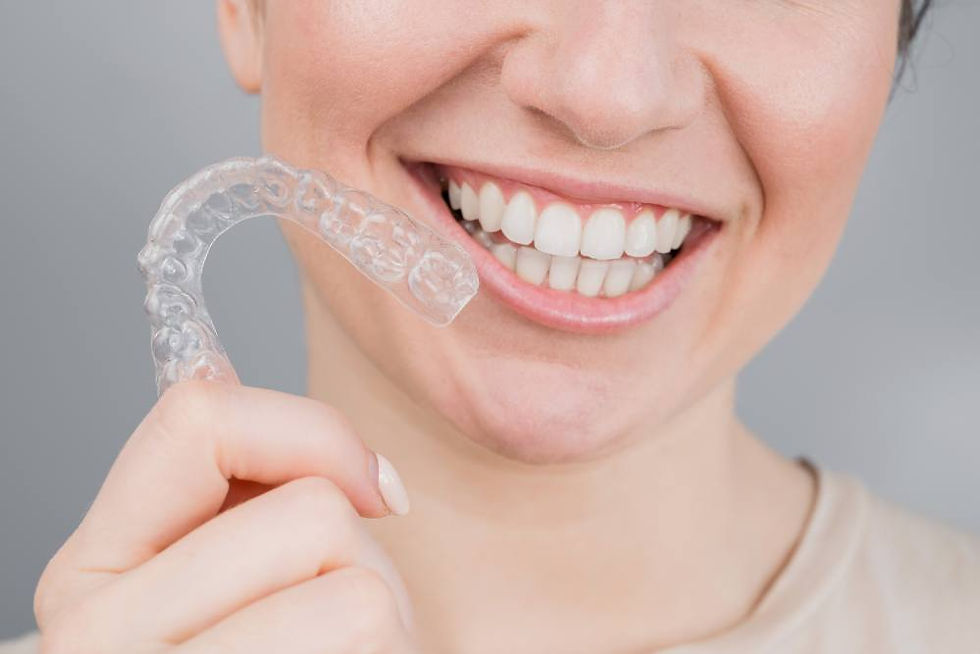How Often Should You Have Your Teeth Cleaned? A Dentist's Guide
- Thomas Baron
- Jul 13, 2025
- 3 min read
Updated: Jul 28, 2025

Regular teeth cleaning is vital for maintaining a healthy smile and overall oral hygiene. Your dentist or dental hygienist will remove the buildup that regular brushing can’t tackle. Plaque develops as a sticky layer from bacteria and food particles.
Left uncleaned, it can harden into tartar that only a professional can remove. This buildup is a leading cause of gum disease, tooth decay, and other dental issues.
If you're asking, "How often should you have your teeth cleaned?", the answer varies depending on your oral health. For most people, twice a year is sufficient. However, some individuals may need more frequent cleanings based on their specific needs.
Let’s explore why regular dental cleanings are necessary and how often you should schedule them.
Factors Affecting the Frequency of Dental Cleanings
Your oral health history, risk for tooth decay, and lifestyle choices all play a role in determining how often you should have your teeth cleaned. If you've a history of gum disease or other dental issues, your dentist may recommend more frequent cleanings, typically every three to four months, to help monitor and manage the condition before it worsens.
Regular cleanings are also necessary for those at higher risk of developing future dental issues. Individuals who are at a higher risk for cavities or tooth decay may benefit from more frequent cleanings as well.
A diet high in sugar, smoking, or ineffective brushing can lead to plaque buildup and tooth decay. In such cases, your dentist may suggest cleanings every three to four months to remove buildup before it causes more significant problems.
Age and lifestyle choices also impact the health of your teeth. Younger people may only need cleanings twice a year, but older individuals or those with specific health conditions may need more frequent visits. Smoking or consuming sugary beverages frequently can increase the risk of gum disease and tooth decay. This means smokers may require more frequent cleanings to prevent plaque and tartar buildup.
Signs You Need More Frequent Teeth Cleanings
If you're unsure about the frequency of your cleanings, there are a few signs to look out for that suggest you may need to visit your dentist more often.
Bleeding gums, for instance, may occur when brushing or flossing and could be an indication of gum disease. As gum disease progresses in stages, regular cleanings can help reverse its early signs. Persistent bad breath, also known as halitosis, is another sign of potential plaque buildup.
It’s important to have this checked by your dentist to rule out any underlying oral health issues. Additionally, if you experience pain or discomfort when eating hot or cold foods, it may suggest that plaque has accumulated on your teeth, affecting both your gums and enamel.
Finally, if you can visibly see or feel plaque or tartar on your teeth, it’s time to visit the dentist. Tartar, which forms when plaque hardens, can only be removed by a professional.
Steps Involved During a Professional Teeth Cleaning
When you visit your dentist for a cleaning, the process is straightforward and typically quick. The dental hygienist will start by using special tools to remove plaque and tartar from your teeth and gums. This process may include scraping the surfaces of your teeth to remove hard deposits.
Afterward, they will polish your teeth using a gritty paste, leaving them smooth and shiny. Fluoride may also be applied to help guard your teeth against cavities.
During your cleaning, your dentist or hygienist may also check for signs of gum disease, cavities, or other oral health issues. If any problems are detected, your dentist will discuss a treatment plan with you.
How to Maintain Healthy Teeth Between Cleanings
Even if you see your dentist regularly, your home care routine plays a significant role in your oral health. Brushing at least twice a day with fluoride toothpaste and flossing daily helps reduce plaque buildup. Regular brushing helps keep your teeth smooth and free from bacteria, while flossing removes food particles stuck between your teeth.
Using mouthwash can also help keep your breath fresh and your mouth clean. Avoiding sugary snacks and drinks, as well as quitting smoking, can further reduce your risk of plaque buildup and tooth decay.
How Brookhaven Dental Associates Can Help
Brookhaven Dental Associates offers comprehensive dental cleanings tailored to your needs. Our team of experienced professionals uses the latest technology and techniques to make sure your teeth remain healthy and strong. We understand that everyone’s oral health is unique. For this reason, we customize your cleaning schedule based on your personal oral health, history, and lifestyle.
If you’re unsure how often you should have your teeth cleaned, our team can assess your condition and suggest the best plan for your situation. We are here to help you maintain a bright, healthy smile and prevent any future dental issues.
Don't wait! Schedule your cleaning with us today to keep your oral health in top shape.




Comments